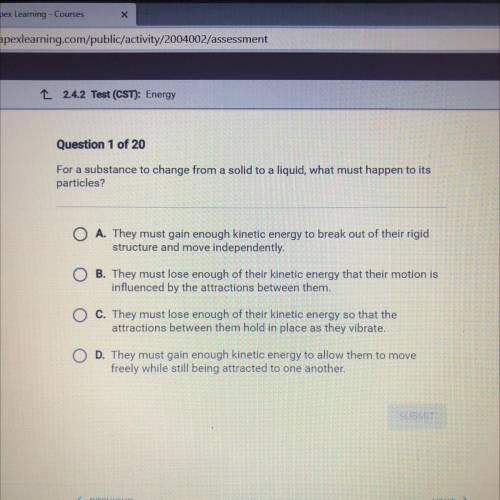For a substance to change from a solid to a liquid, what must happen to its
particles?
A. The...

For a substance to change from a solid to a liquid, what must happen to its
particles?
A. They must gain enough kinetic energy to break out of their rigid
structure and move independently.
B. They must lose enough of their kinetic energy that their motion is
influenced by the attractions between them.
C. They must lose enough of their kinetic energy so that the
attractions between them hold in place as they vibrate.
O D. They must gain enough kinetic energy to allow them to move
freely while still being attracted to one another.


Answers: 2


Another question on Physics

Physics, 21.06.2019 17:30
Abatter hits the baseball a with an initial velocity of v0 = 110 ft/sec directly toward fielder b at an angle of 23° to the horizontal; the initial position of the ball is 2.2 ft above ground level. fielder b requires 0.44 sec to judge where the ball should be caught and begins moving to that position with constant speed. because of great experience, fielder b chooses his running speed so that he arrives at the “catch position” simultaneously with the baseball. the catch position is the field location at which the ball altitude is 8.4 ft. determine the velocity of the ball relative to the fielder at the instant the catch is made.
Answers: 1


Physics, 22.06.2019 06:00
An ideal gas is held in a container at constant volume. initially, its temperature is 5 degrees c and its pressure is 1.2 atm. what is its pressure when its temperature is 43 degrees c? answer in units of atm
Answers: 2

Physics, 22.06.2019 08:00
Tafari worked one summer on a ship that set weather buoys in the ocean. he watched how one of the buoys moved in the water. describe which parts of the wave would cause the buoy to bob up and down. which wave property determined how fast the buoys bobbed in the water? he observed that when the wind blew harder, the ocean waves were larger, and the buoys moved away from the ship. what effect, if any, did the waves have on how far the buoys moved? explain your answer.
Answers: 3
You know the right answer?
Questions

Biology, 18.09.2019 03:30





History, 18.09.2019 03:30

Mathematics, 18.09.2019 03:30


Social Studies, 18.09.2019 03:30




Spanish, 18.09.2019 03:30

Mathematics, 18.09.2019 03:30

Biology, 18.09.2019 03:30

Biology, 18.09.2019 03:30


English, 18.09.2019 03:30

Health, 18.09.2019 03:30

Biology, 18.09.2019 03:30



